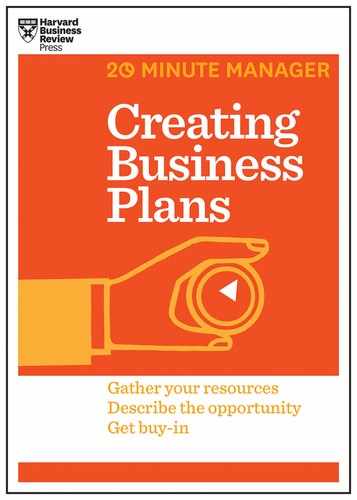Learn More
Articles
Elsbach, Kimberly D. “How to Pitch a Brilliant Idea.” Harvard Business Review (September 2003; product #R0309J).
Coming up with creative ideas is easy; selling them to strangers is hard. Entrepreneurs, sales executives, and marketing managers often go to great lengths to demonstrate that their new concepts are practical and profitable—only to be rejected by corporate decision makers who don’t seem to understand the value of the ideas. Why does this happen? Having studied Hollywood executives who assess screenplay pitches, the author says the person on the receiving end—the “catcher”—tends to gauge the pitcher’s creativity as well as the proposal itself. An impression of the pitcher’s ability to come up with workable ideas can quickly and permanently overshadow the catcher’s feelings about an idea’s worth. To determine whether these observations apply to business settings beyond Hollywood, the author attended product design, marketing, and venture-capital pitch sessions and conducted interviews with executives responsible for judging new ideas. The results in those environments were similar to her observations in Hollywood, she says. Catchers subconsciously categorize successful pitchers as showrunners (smooth and professional), artists (quirky and unpolished), or neophytes (inexperienced and naïve). The research also reveals that catchers tend to respond well when they believe they are participating in an idea’s development.
Magretta, Joan. “Why Business Models Matter.” Harvard Business Review (May 2002; product #R0205F).
“Business model” was one of the great buzzwords of the internet boom. A company didn’t need a strategy, a special competence, or even any customers—all it needed was a web-based business model that promised wild profits in some distant, ill-defined future. Many people—investors, entrepreneurs, and executives alike—fell for the fantasy and got burned. And as the inevitable counterreaction played out, the concept of the business model fell out of fashion nearly as quickly as the .com appendage itself. That’s a shame, says Joan Magretta. As she explains, a good business model remains essential to every successful organization, from new ventures to established players. To help managers apply the concept successfully, she defines what a business model is and how it complements a smart competitive strategy. Business models are, at heart, stories that explain how enterprises work. Like a good story, a robust business model contains precisely delineated characters, plausible motivations, and a plot that turns on an insight about value. It answers certain questions: Who is the customer? How do we make money? What underlying economic logic explains how we can deliver value to customers at an appropriate cost? Every viable organization is built on a sound business model, but a business model isn’t a strategy, even though many people use the terms interchangeably. Business models describe how the pieces of a business fit together as a system. But they don’t factor in one critical dimension of performance: competition. That’s strategy’s job. Illustrated with examples from companies like American Express, EuroDisney, Wal-Mart, and Dell Computer, this article clarifies the concepts of business models and strategy, which are fundamental to every company’s performance.
Rich, Stanley R. and David E. Gumpert. “How to Write a Winning Business Plan.” Harvard Business Review (January 2001; product #584X).
A well-conceived business plan is essential to the success of an enterprise. Whether you are starting up a venture, seeking additional capital for an existing product line, or proposing a new activity for a corporate division, you will have to write a plan detailing your project’s resource requirements, marketing decisions, financial projections, production demands, and personnel needs. Too many business plans focus excessively on the producer, yet as this article shows, the plan must reflect the viewpoint of three constituencies: the customer, the investor, and the producer.
Sahlman, William A. “How to Write a Great Business Plan.”Harvard Business Review (July–August 1997; product #97409).
Most business plans devote far too much ink to the numbers—and far too little to the information that really matters: the people, the opportunity, the context, and the possibilities for both risk and reward. This article builds on Sahlman’s “Some Thoughts on Business Plans” and shows managers how to pose—and answer—the right questions as they prepare their business plans.
Books
Covello, Joseph and Brian Hazelgren. Your First Business Plan: A Simple Question and Answer Format Designed to Help You Write Your Own Plan. 5th ed. Naperville, IL: Source-books, 2005.
This guide to writing a business plan includes a step-by-step process that focuses on the USA (Unique Selling Advantage). It includes a model of a complete business plan and a glossary of terms.
Harvard Business School Publishing. Entrepreneur’s Toolkit: Tools and Techniques to Launch and Grow Your New Business. Boston: Harvard Business Review Press, 2004.
Starting an independent business is rife with both opportunity and peril. From the basics of writing a business plan to the challenges of financing a new venture, Entrepreneur’s Toolkit is the essential resource for success. Topics include: navigating the world of venture capital funding, turning innovations into successful marketplace realities, establishing priorities and effective time management, and developing the sales and marketing programs needed for your venture.
Pinson, Linda. Anatomy of a Business Plan: The Step-by-Step Guide to Building a Business and Securing Your Company’s Future. 8th ed. Tustin, CA: Out of Your Mind and Into the Marketplace, 2014.
The new edition has been revised to reflect the latest online and printed financial and marketing resources and current business plan practices. This business plan book is loaded with ready-to-use-forms and worksheets and five complete real-world business plans.
